Why Does My Cat Breathe Like A Dog?
Have you ever noticed that your cat’s breathing seems more like a dog’s panting? It can be concerning to see your feline friend struggle for air. Now the question is, why does your cat breathe like a dog?
Well, Abnormal breathing in cats, also known as dyspnea, can be caused by various factors such as fluid in the chest, enlarged heart, asthma, and heartworm disease.
Identifying the cause of your cat’s abnormal breathing is crucial for providing proper treatment. This discussion will explore the potential causes of a cat’s panting and breathing like a dog and how to address the issue.
Looking for more article about cats:
Explanation The Basics of Cat Breathing
Understanding the basics of cat breathing is key to keeping your furry friend healthy. To ensure your cat stays safe and strong, it’s important to learn the basics of their breathing.
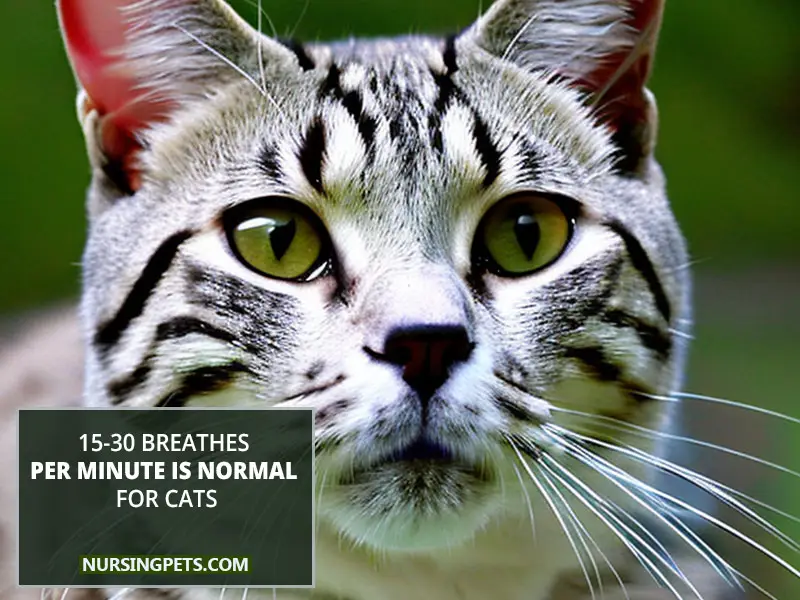
So, what is normal cat breathing? The normal breathing rate for a healthy cat is between 15-30 breaths per minute. Symptoms of dyspnea, or difficulty breathing, include a rate over 40 breaths per minute, head and neck extended while breathing, coughing, and panting.
One more crucial point to look for is wheezing or stridor, which can indicate a problem with the airways. Cats with asthma, allergies, or heart disease may have difficulty breathing. Moreover, cats can’t sweat like humans, so they sometimes pant to cool themselves off in hot weather.
Is It Normal For Cats To Pant Like A Dog?
It’s not normal for cats to pant like a dog. Cats don’t typically pant unless they’re overheated, anxious, or suffering from an underlying medical condition like heart disease, respiratory distress, or poisoning.
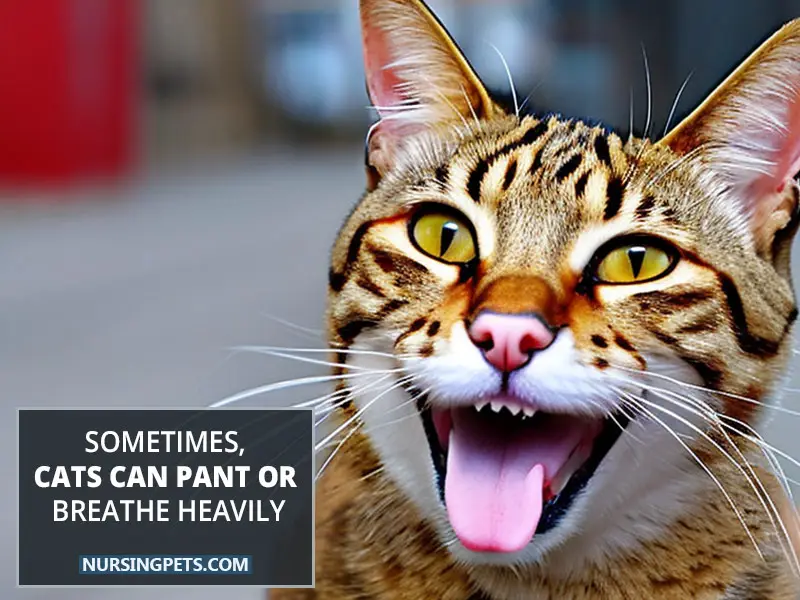
While cats may pant to regulate body temperature, it’s usually only after exertion and not for extended periods.
6 Possible Causes of Abnormal Cat Breathing
Abnormal cat breathing is a worrying issue for many pet owners. It can be a sign of a serious health problem, so you must pay attention and seek out any changes in your cat’s breathing. Here are some of the possible causes of abnormal cat breathing:
01. Managing Body Temperature
Cats have tiny sweat glands on their paw pads and between their toes, making panting one of their primary means of regulating their body temperature. They pant to release heat, especially when they are overheated.
02. Cardiac Disease
“Hypertrophic cardiomyopathy” is also responsible for abnormal cat breathing. In this disease, the heart is enlarged and pumps more blood which can accumulate fluid in the chest or lungs.
This can lead to open-mouthed breathing and difficulty breathing. Cats with an enlarged heart might show signs of lethargy.
03. Lung and Airway Problems
Cats may also experience dyspnea due to lung or airway problems. Some common lung and airway problems that can cause difficulty breathing in cats include asthma, bronchitis, pneumonia, and lung cancer.
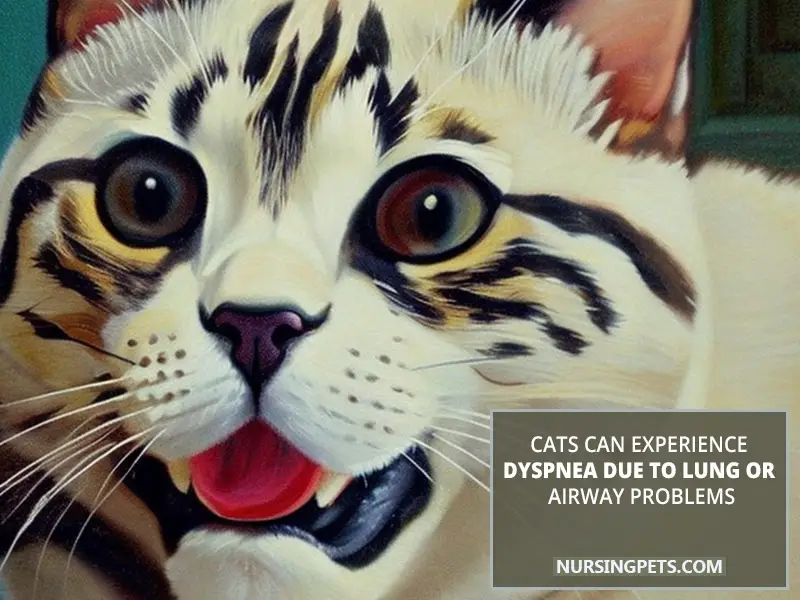
These conditions can trigger inflammation and narrowing of the airways, making it difficult for the cat to breathe.
04. Non-Respiratory Factors
Other non-respiratory factors can cause breathing troubles, such as spontaneous, congenital (the cat is born with the issue), or gradually developing over time.
Some conditions that can cause your cat to experience breathing problems include heartworm, anemia, and obesity.
05. Trauma or Injury
Trauma and injury to the chest or lungs can cause difficulty breathing in cats. This can be provoked by a fall, a car accident, or a fight with another animal.
06. Poisoning
Ingestion of certain toxins can cause respiratory distress in cats. Common toxins that can cause difficulty breathing include smoke, pesticides, and cleaning products.
Remember that rapid breathing in cats can be a sign of serious underlying conditions. So take immediate steps to help your cat in this painful situation.
How Can I Tell If My Cat Is Having Trouble Breathing?
As a pet parent, it’s important to be aware of the signs that indicate your cat is having difficulty breathing. Here are some tips to help you identify a cat’s breathing trouble:
- Head and neck extended in front of the body while breathing
- Coughing
- Open mouth breathing/panting
- Noisy breathing (stridor)
- The belly and chest move significantly while breathing
- Hiding
- Blue-tinged gums
- Foam or froth coming out of the mouth
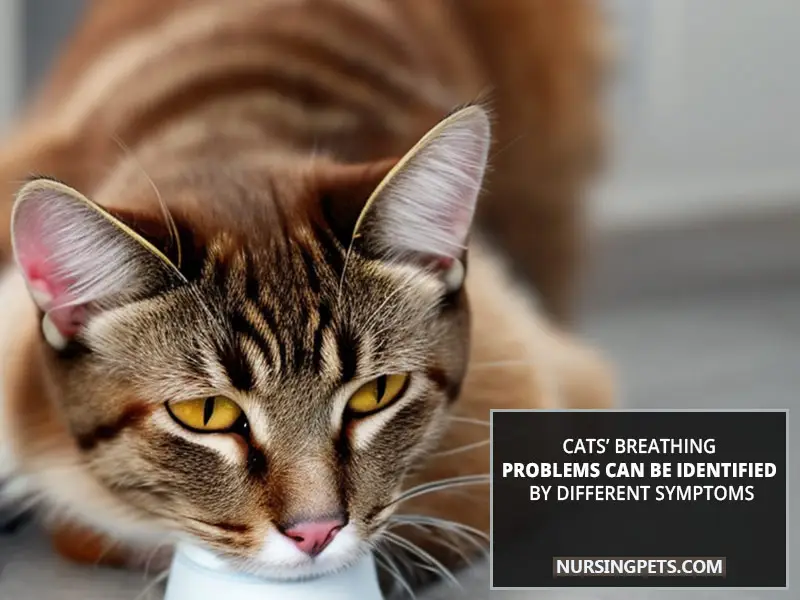
Whenever you suspect your cat is having trouble breathing, you should consult a veterinarian. They may use a stethoscope to listen to the cat’s lungs and chest and check for fluid in the lungs or an abnormal heartbeat or murmur.
When Should I Worry About My Cat Breathing?
You should be concerned if your cat’s breathing is abnormal, which means it is unusually slow, fast, or noisy (has a high, harsh, or whistling sound) or the cat is having difficulty breathing.
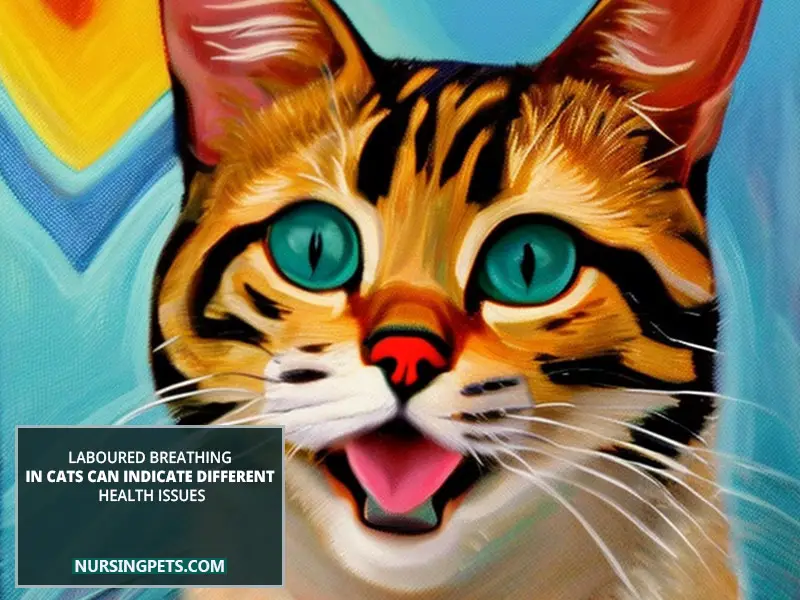
Normally, cats take 15-30 breaths per minute, but some cats may have lower rates. However, when your cat’s breathing is labored, it can be a sign of a deeper respiratory, heart, or lung problem.
You should also be concerned when your cat’s chest or sides are moving too much, as it may indicate labored breathing.
When To Seek Veterinary Care For Cat Breathing Issues?
Seek immediate veterinary care if your cat is showing any symptoms of respiratory distress, such as rapid breathing with the mouth open, labored breathing, coughing, open mouth breathing, hiding, or blue-tinged gums.
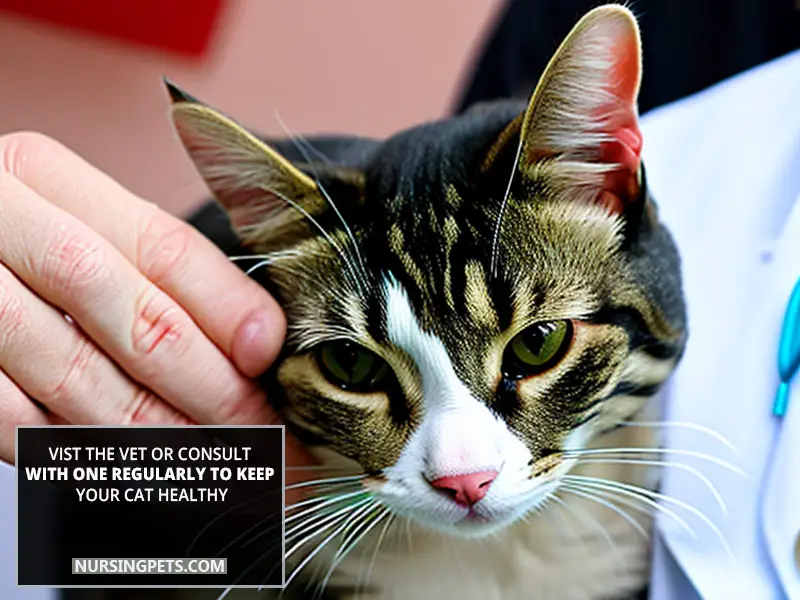
Once your cat’s condition is stable, the veterinarian will need to determine the underlying disease or disorder causing the difficulty in breathing.
After that, they can perform any necessary procedures, such as administering oxygen or performing a chest tap to remove fluid from the chest cavity.
How Do You Calm A Cat Down From Panting?
If your cat is panting excessively, it’s important to take steps to help them calm down. Here are a few tips to help your cat relax:
- Create a comfortable, quiet environment. Reduce any sources of noise and minimize distractions.
- Provide a safe space. Make sure your cat has access to a safe area where it can feel secure.
- Play some calming music. Soft, soothing music can help your cat relax and calm down.
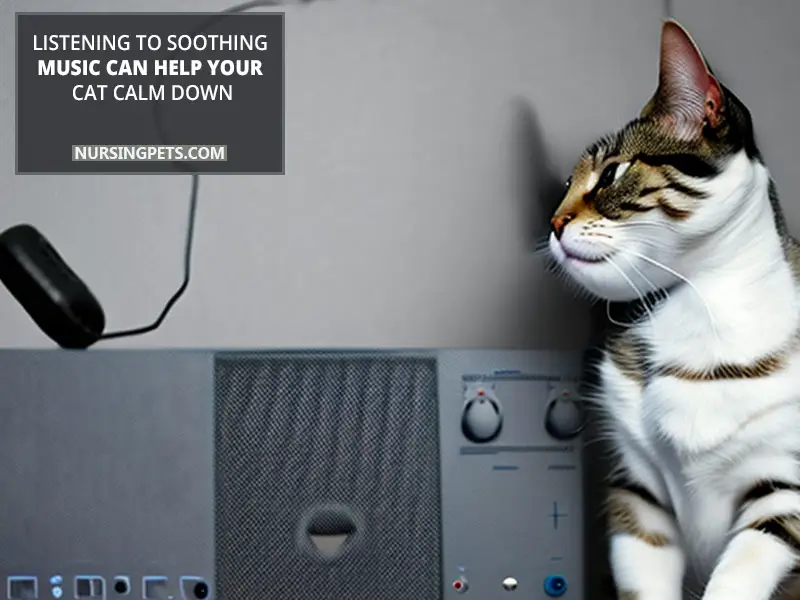
- Offer treats. Many cats find treats calming, so try offering your cat some treats or toys.
- Pet your cat. Gently pet your cat’s back, neck, and head in a slow, rhythmic motion. This helps to relax your cat and can reduce panting.
- Provide extra water. In case your cat is panting due to being too hot, provide extra water for them to drink.
- Keep an eye on your cat. After your cat is relaxed, watch them for any signs of continued panting. If the panting persists, contact a vet for advice.
By following these steps, you should be able to calm down your panting cat and help them feel safe and secure.
Tips For Helping Your Cat Maintain Healthy Breathing Habits?
Do you worry about your cat’s breathing habits? You need to know how to help your cat maintain healthy breathing habits. Here are some tips for helping your cat maintain healthy breathing habits:
- Monitor your cat’s breathing and watch for signs of difficulty. Look for signs such as rapid, labored, or open-mouth breathing. If you notice any of these signs, take your cat to the vet immediately.
- Keep your cat away from second-hand smoke. Second-hand smoke is a leading cause of breathing problems in cats.
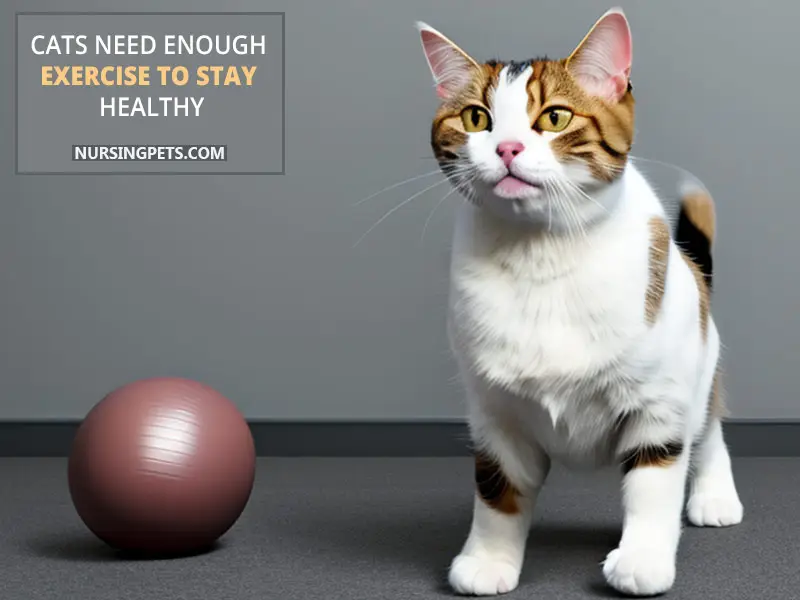
- Make sure your cat is getting enough exercise. Exercise helps cats get the oxygen they need and keeps their airways clear.
- Keep your cat’s environment clean. Dust and dirt can build up and cause respiratory problems in cats.
- Have your cat vaccinated against respiratory illnesses. Vaccines can help protect your cat from respiratory illnesses like Feline Calicivirus, Feline Herpesvirus, and Feline Panleukopenia.
- Keep your cat away from other sneezing or coughing cats. This can help reduce the risk of contagious respiratory illness.
- Make sure your home is free from toxins, such as smoke, aerosols, and cleaning supplies. These can cause respiratory irritation and difficulty breathing.
If you’re worried about your cat’s breathing habits, it’s important to know how to tell if your cat is having trouble breathing. Check for signs such as rapid, labored, or open-mouth breathing.
Frequently Asked Questions
1. Why Is My Cat Panting With Tongue Out And Mouth Open?
Cats may pant due to heat, stress, or excitement. It can also be a symptom of serious health issues such as anemia, asthma, breathing difficulties, bronchitis, or congestive heart failure.
2. Is Rapid Breathing In Cats An Emergency?
Sometimes rapid breathing in cats is an emergency. It can be caused by a variety of conditions, including heart, respiratory, and nervous system problems, and can be life-threatening if not treated quickly.
3. Why Is My Cat Panting And Meowing?
Your cat may be panting and meowing due to stress or anxiety. Make sure your cat is comfortable in its environment, and look for signs of medical issues such as fever, pain, or infection.
Epilogue
Heavy or labored breathing in cats, also known as dyspnea, can be a sign of several health issues. Causes can range from respiratory infections to cancer and heart failure. Rapid breathing can also be a warning sign of underlying problems.
Identifying the cause of your cat’s breathing issues is crucial to treating it effectively. Remember, your cat can’t tell you when something is wrong, so it’s up to you to be vigilant about their health.
Article References:
- https://www.petmd.com/cat/emergency/commonemergencies/e_ct_difficulty_breathing
- https://www.yahoo.com/lifestyle/cat-panting-dog-heres-why-190535668.html
- https://petcube.com/blog/heavy-breathing-cats/
- https://wagwalking.com/cat/condition/breathing-difficulties
Image Credit:
- Stock.adobe.com

